Overview
Startups must recognize critical signals when hiring engineering talent. Key attributes include:
- Adaptability to remote work
- Cultural fit
- Collaboration skills
- Growth mindset
These qualities are essential for new hires to thrive in dynamic startup environments and contribute effectively to their teams. By prioritizing these traits, startups can build a resilient workforce capable of navigating challenges and driving innovation. Are you ready to enhance your hiring strategy and secure top talent?
Introduction
In the fast-paced world of startups, the identification of the right engineering talent has never been more crucial. As companies strive to build innovative teams, grasping the key signals that indicate a candidate's potential is essential for success. This article explores ten critical factors that not only enhance the hiring process but also align with the evolving landscape of engineering roles. What hidden traits should startups prioritize to ensure they are selecting candidates capable of thriving in a dynamic environment?
Websets: AI-Powered Insights for Identifying Top Engineering Talent
harnesses advanced algorithms to navigate extensive datasets, empowering companies to efficiently identify top engineering talent. Our AI-driven talent discovery and qualification process significantly enhances search outcomes with comprehensive profiles, which include LinkedIn details, emails, company information, and prior work experience. Recruiters can filter candidates by skills, experience, location, and more, enabling them to make informed decisions swiftly and streamlining the talent acquisition process.
Moreover, Websets offers invaluable insights for venture capitalists by filtering portfolio companies based on industry, stage, and location, ensuring they uncover startups at the forefront of technology. This AI-driven approach not only conserves time but also elevates the quality of hires, offering valuable signals from engineering hires in startups that are striving to assemble robust teams of developers.
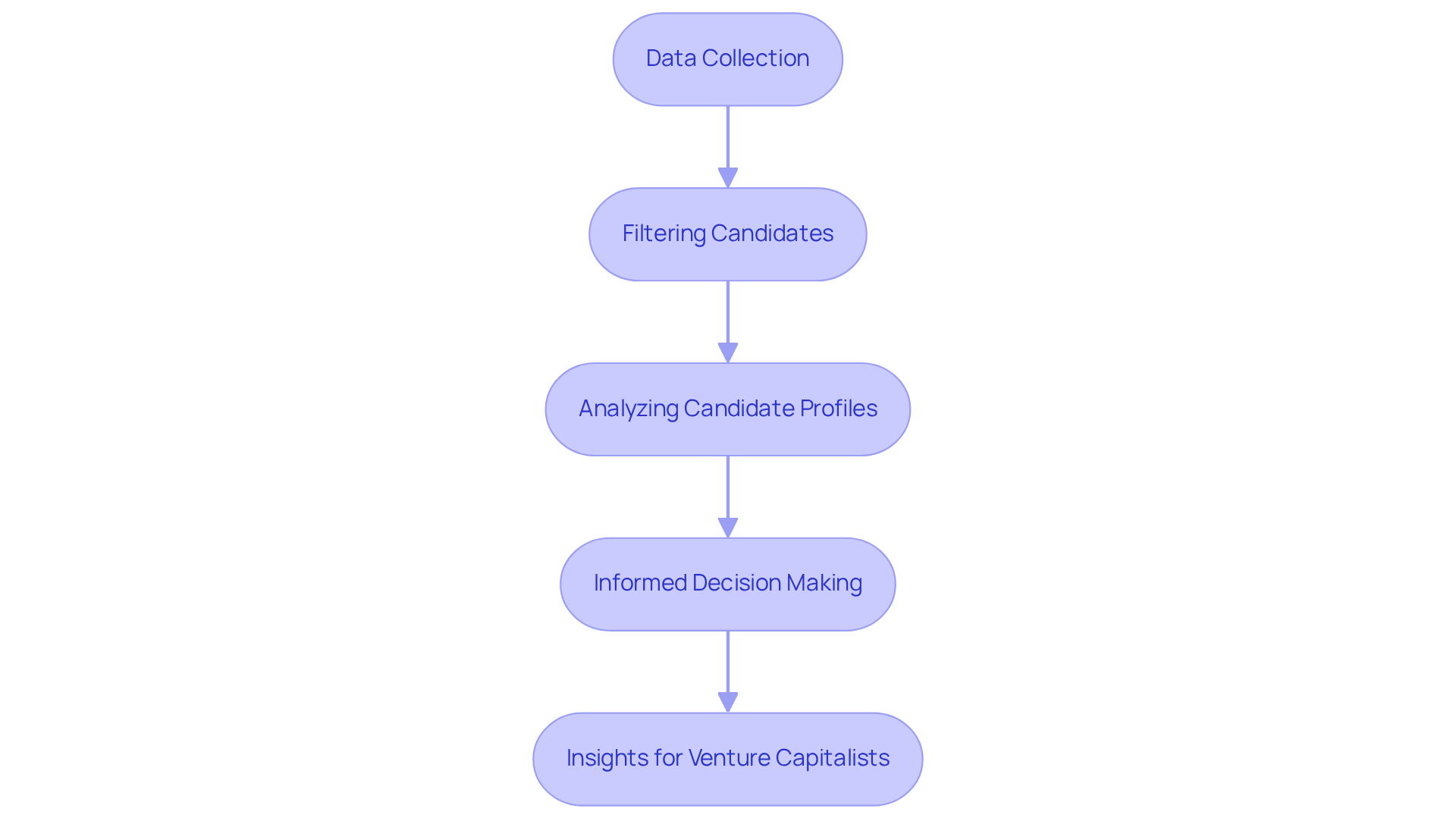
Remote Work Adaptation: A Key Signal in Engineering Hiring Practices
In 2025, adaptability to remote work environments is essential for engineering hires. Candidates who exhibit flexibility and proficiency in remote collaboration tools are in high demand. New ventures must prioritize applicants who have successfully navigated remote work challenges. This adaptability not only but also fosters group cohesion in a hybrid work environment. By focusing on these qualities, organizations can position themselves for success in an evolving workplace landscape.
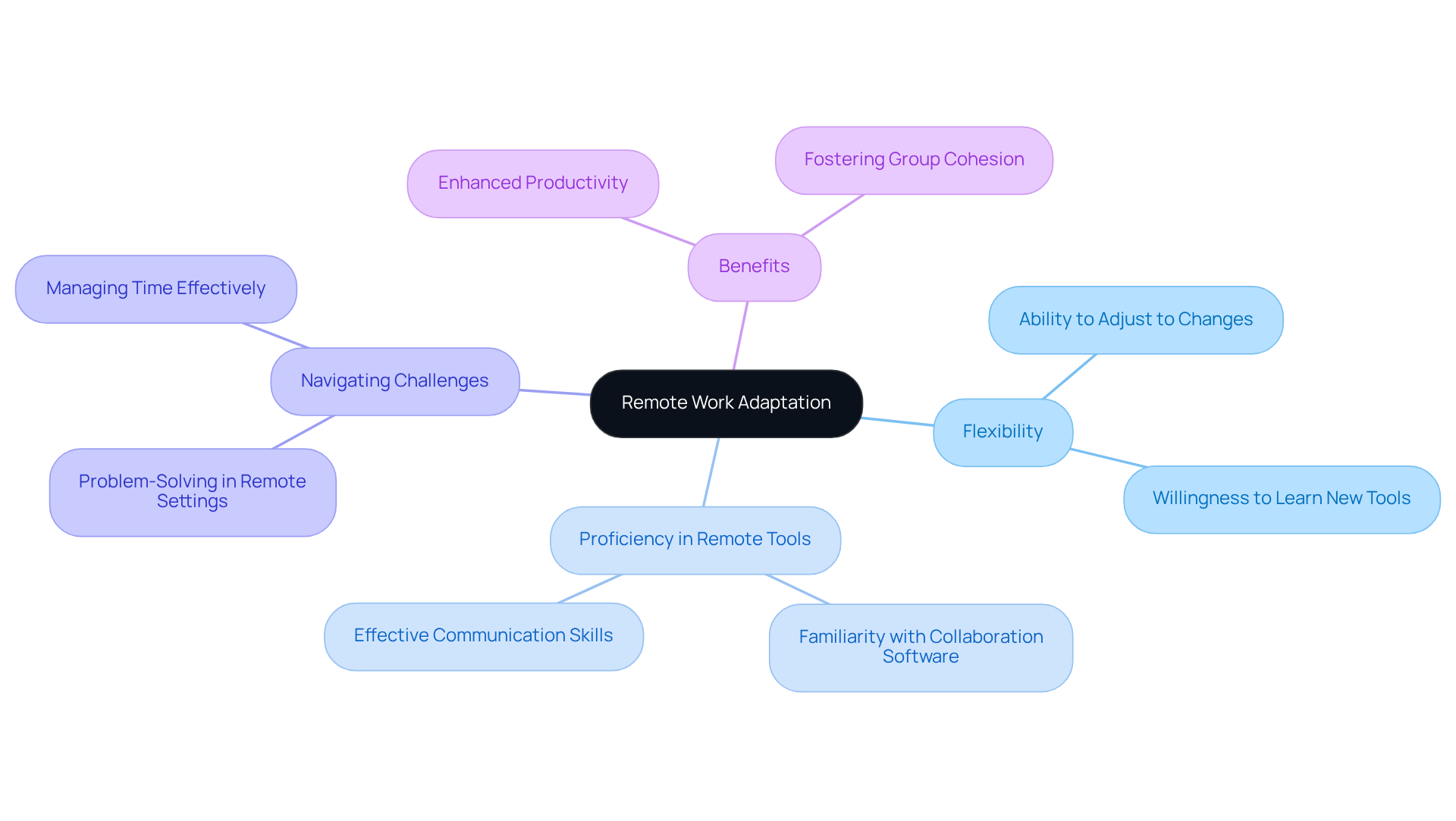
Cultural Fit Assessment: A Critical Signal for Engineering Hires
Cultural fit is essential when hiring engineers for startups. Candidates who align with the company's mission and values are far more likely to excel and make significant contributions to the team. To ensure this alignment, new ventures must implement structured interviews and assessments. These tools not only evaluate the necessary technical skills but also confirm that new hires share the company's vision and ethos. Ultimately, can lead to a more cohesive and effective team.
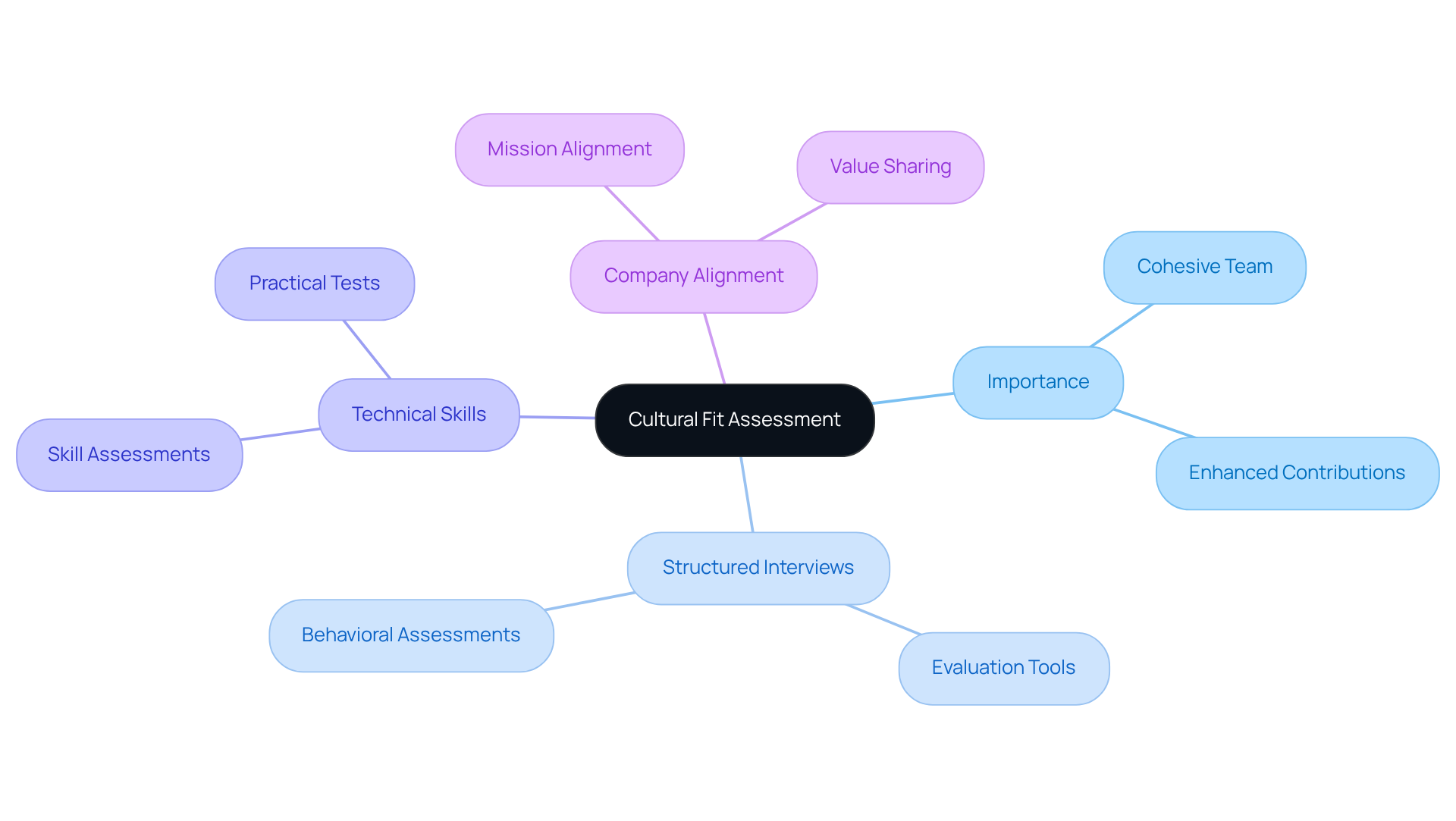
Technological Adaptability: A Signal of Future-Ready Engineering Candidates
Technological flexibility stands as a crucial indicator for professionals preparing for the future. As industries evolve, engineers must not only be willing to learn but also adept at integrating new technologies into their workflows. Candidates who demonstrate a history of embracing change and acquiring new skills will undoubtedly distinguish themselves in the hiring process.
Startups should actively seek signals from engineering hires in startups that indicate continuous learning and adaptability in candidates' backgrounds, such as:
- Participation in relevant training
- Involvement in innovative projects
This proactive approach not only but also aligns with the dynamic nature of modern engineering.
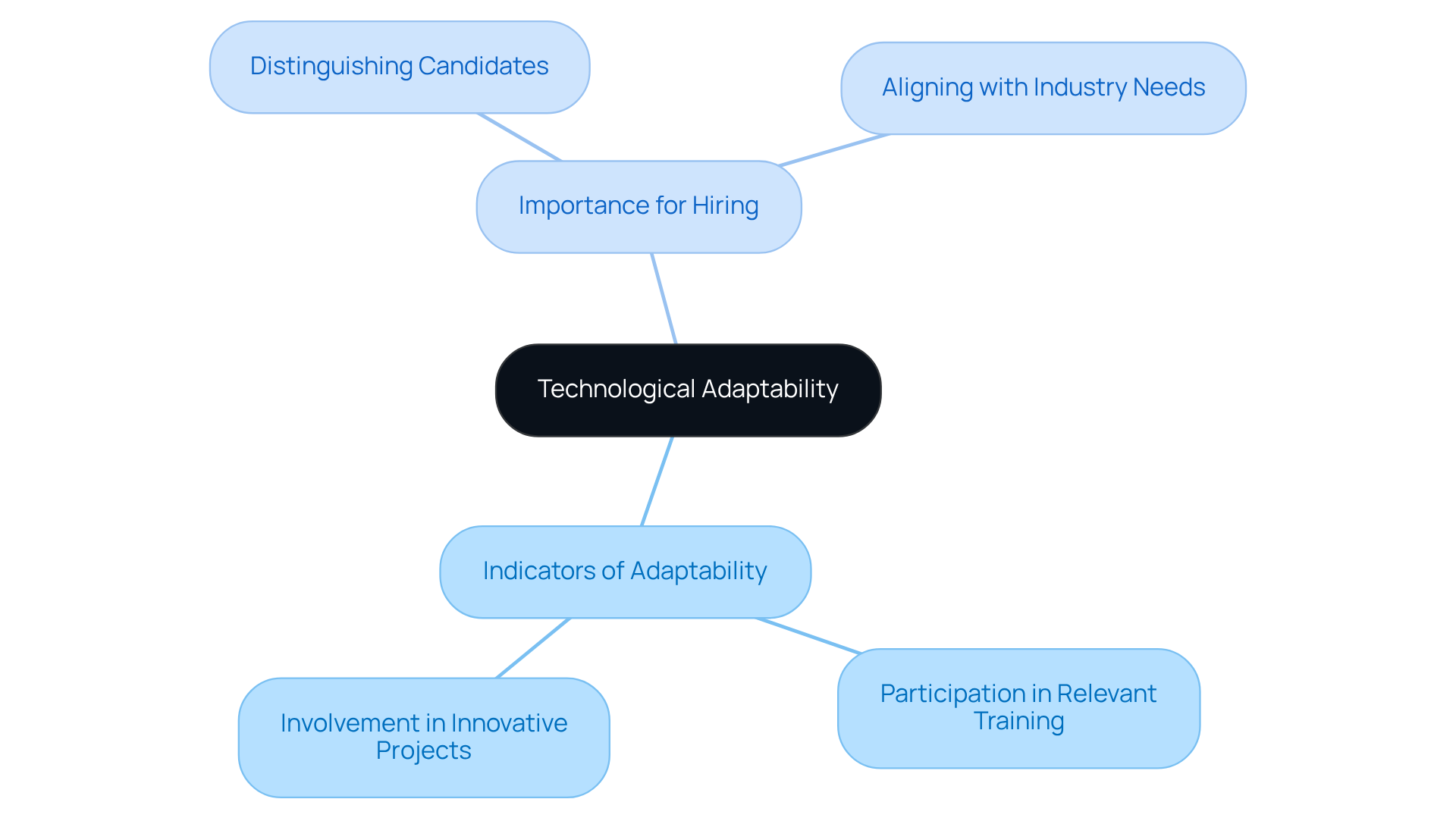
Collaboration Skills: An Essential Signal for Engineering Talent
Signals from engineering hires in startups indicate that collaboration skills are vital for engineering talent, especially where teamwork is essential for success. Candidates who can effectively demonstrate their ability to work in teams, communicate openly, and contribute to group problem-solving are highly sought after, reflecting the signals from engineering hires in startups.
Startups must evaluate teamwork capabilities through behavioral interview questions and group activities during the hiring process. This approach ensures that individuals can , ultimately driving the success of new ventures.
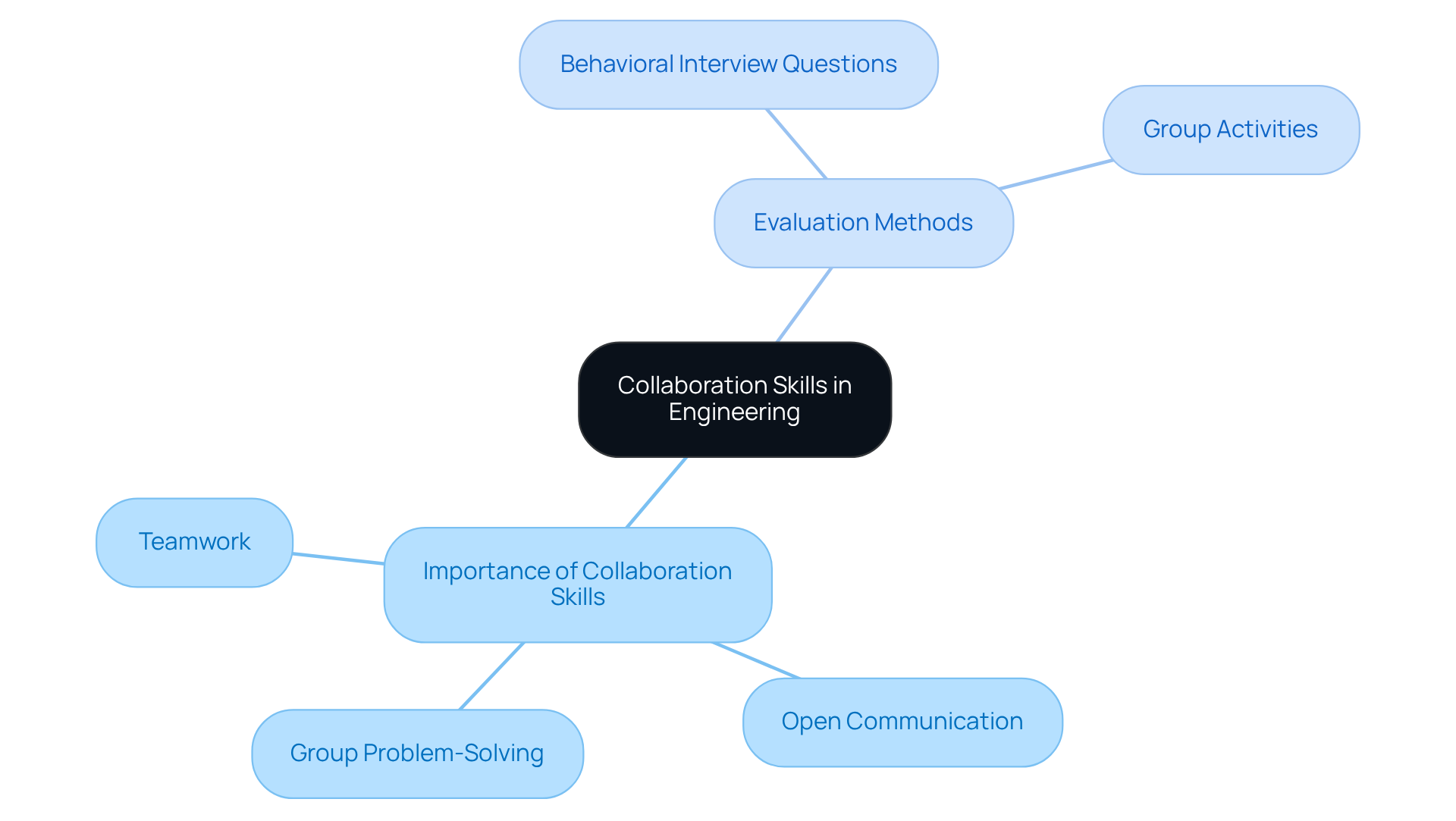
Practical Experience: A Signal of Engineering Competence in Startups
Practical experience serves as a pivotal indicator of technical competence, particularly in startup environments where resources can be scarce. Candidates who have participated in internships, co-op programs, or relevant projects showcase their ability to translate theoretical knowledge into real-world applications.
Startups should prioritize individuals with a proven track record of practical experience, as these are often signals from engineering hires in startups. This not only facilitates quicker integration into teams but also fosters prompt contributions, driving the venture forward.
By recognizing the value of hands-on experience, new ventures position themselves for success in a competitive landscape.
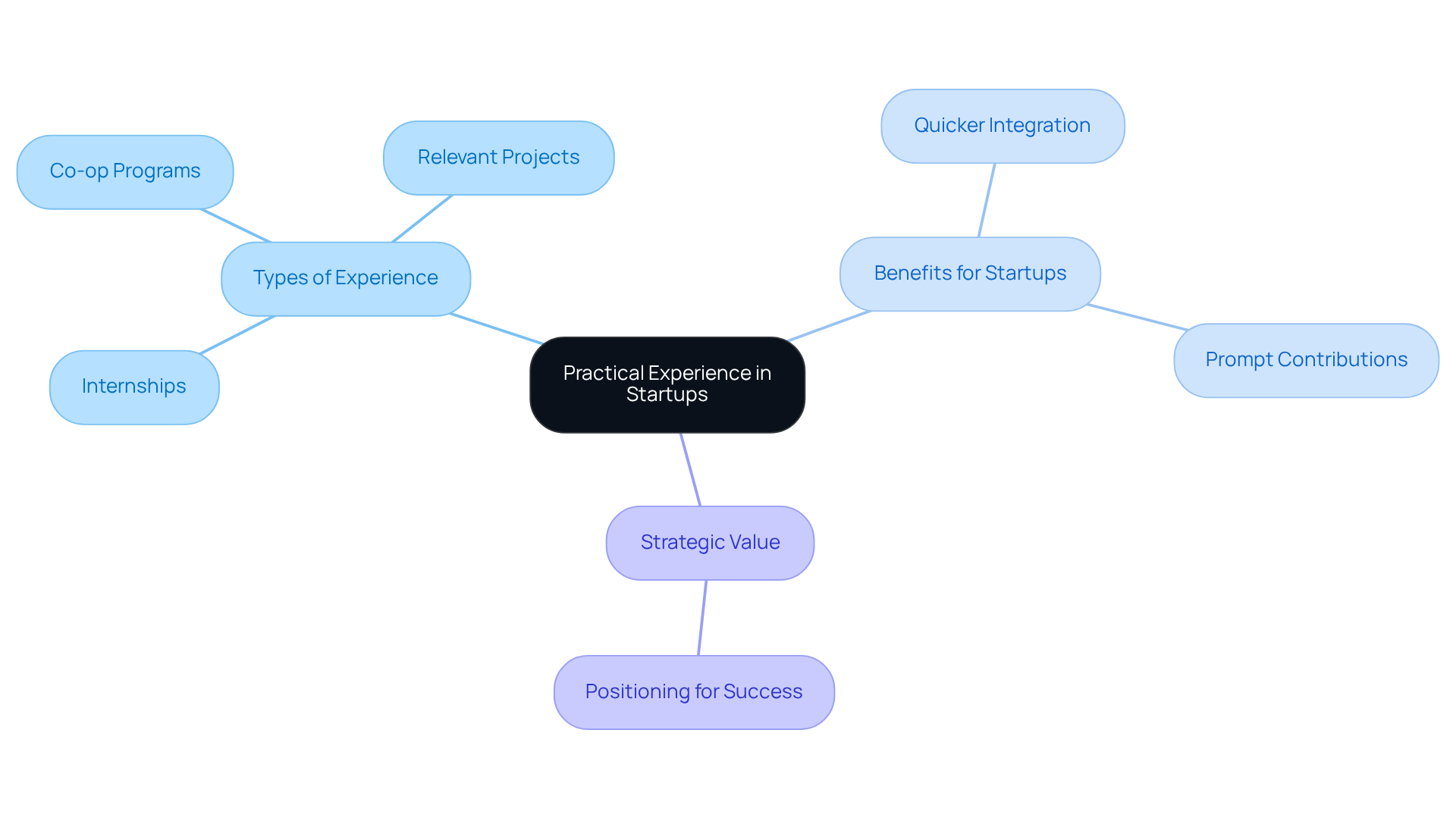
User-Centric Mindset: A Signal of Commitment in Engineering Hires
A user-focused mindset stands as a crucial indicator of dedication in technical hires. Candidates who grasp user needs and prioritize user experience are more likely to drive the development of successful products. Startups must actively seek candidates capable of providing concrete examples of how they have integrated user feedback into their projects. This not only showcases their commitment to crafting solutions that genuinely but also positions the startup for greater success in a competitive landscape.
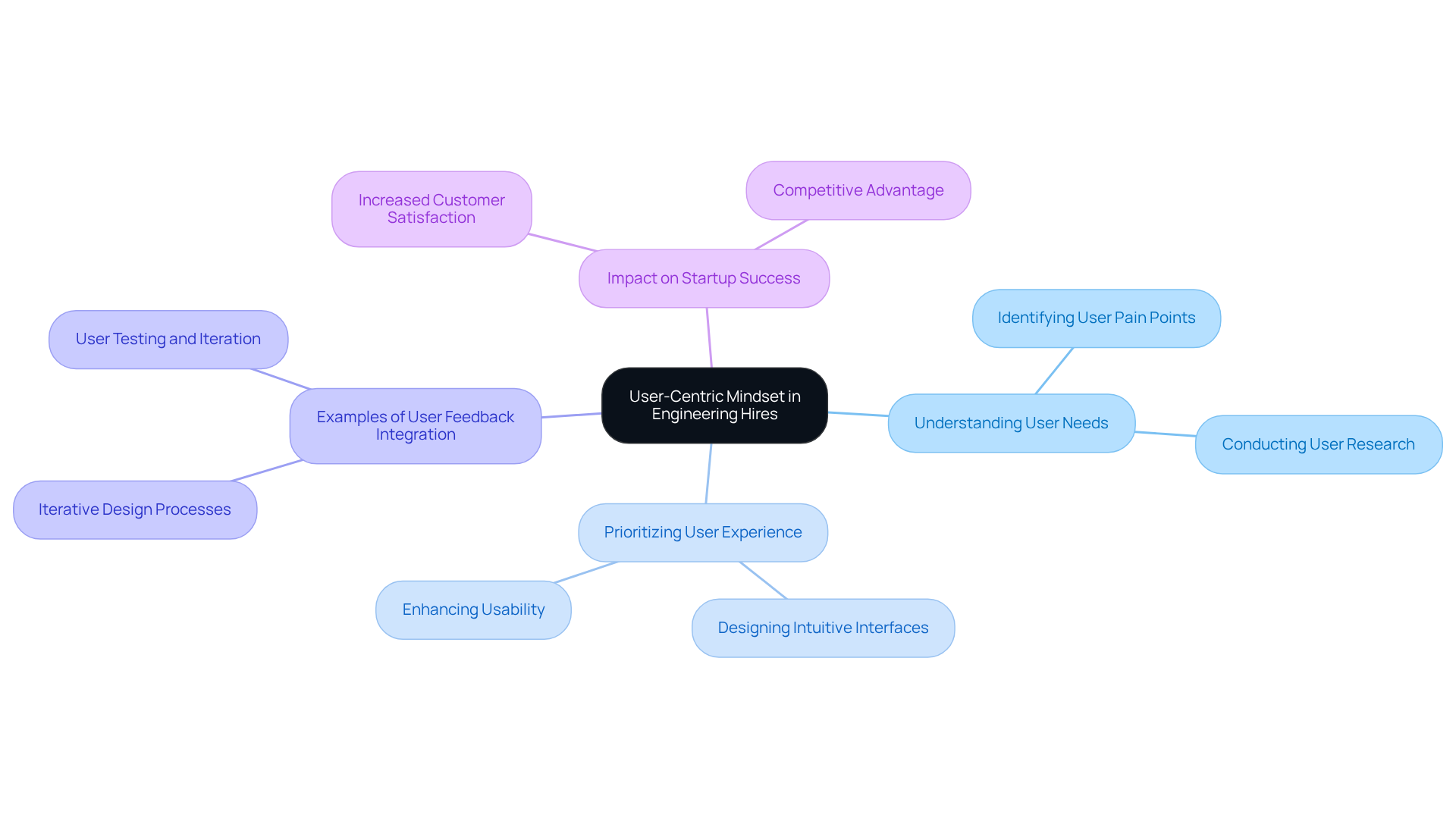
Effective Communication: A Signal of Team Compatibility in Engineering Roles
Effective communication serves as a critical indicator of group compatibility in engineering roles. Candidates who articulate their ideas clearly, listen attentively, and engage in constructive dialogue are more likely to integrate seamlessly into teams. During the hiring process, startups must prioritize the evaluation of communication skills and the signals from engineering hires in startups. This can be achieved by utilizing interviews and group discussions to assess applicants' abilities to convey complex technical concepts to both technical and non-technical stakeholders. As Cristian Peralta, Training and Development Coordinator at WEIR Chile, asserts, effective communication is essential for fostering collaboration and enhancing operational efficiency.
The positive outcomes reported by participants in WEIR Chile's English training program further illustrate the significance of strong communication skills on team dynamics. Participants have noted increased confidence in global projects and improved collaboration with international offices. By adopting structured evaluation techniques similar to those employed in the WEIR Group's training program, startups can ensure they select individuals who demonstrate signals from engineering hires in startups, contributing to smoother project execution and innovation. This strategic approach not only but also drives overall success in a competitive landscape.
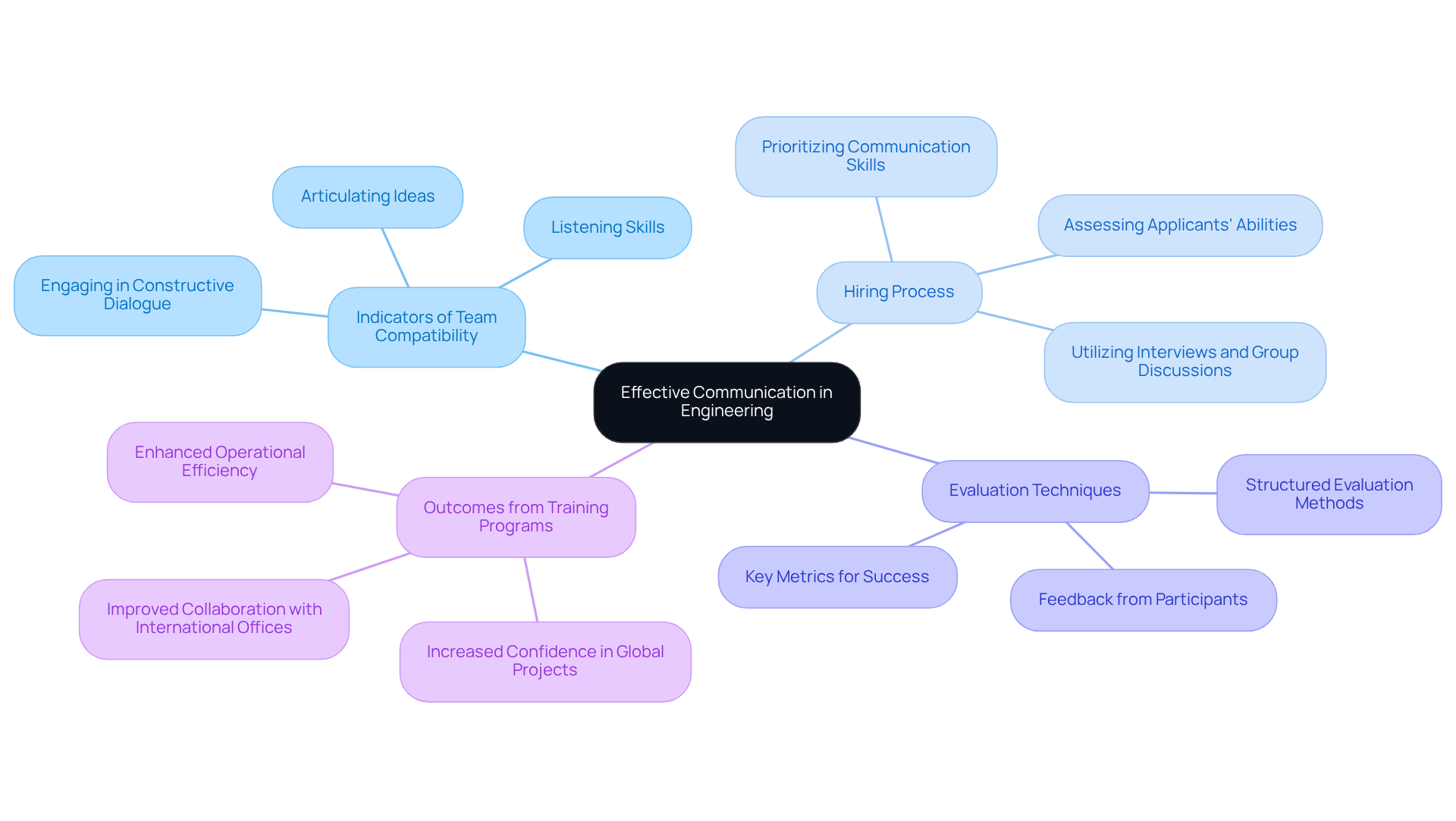
Proactive Problem-Solving: A Signal of Initiative in Engineering Candidates
Proactive problem-solving serves as signals from engineering hires in startups, indicating initiative in engineering applicants. Those who can identify challenges and without waiting for direction become invaluable assets to any team. New companies should actively seek individuals who can demonstrate their problem-solving skills through previous experiences, taking into account signals from engineering hires in startups. Consider initiatives where they took charge in tackling challenges or enhancing procedures. Such candidates not only showcase their capabilities but also contribute significantly to the organization's success.
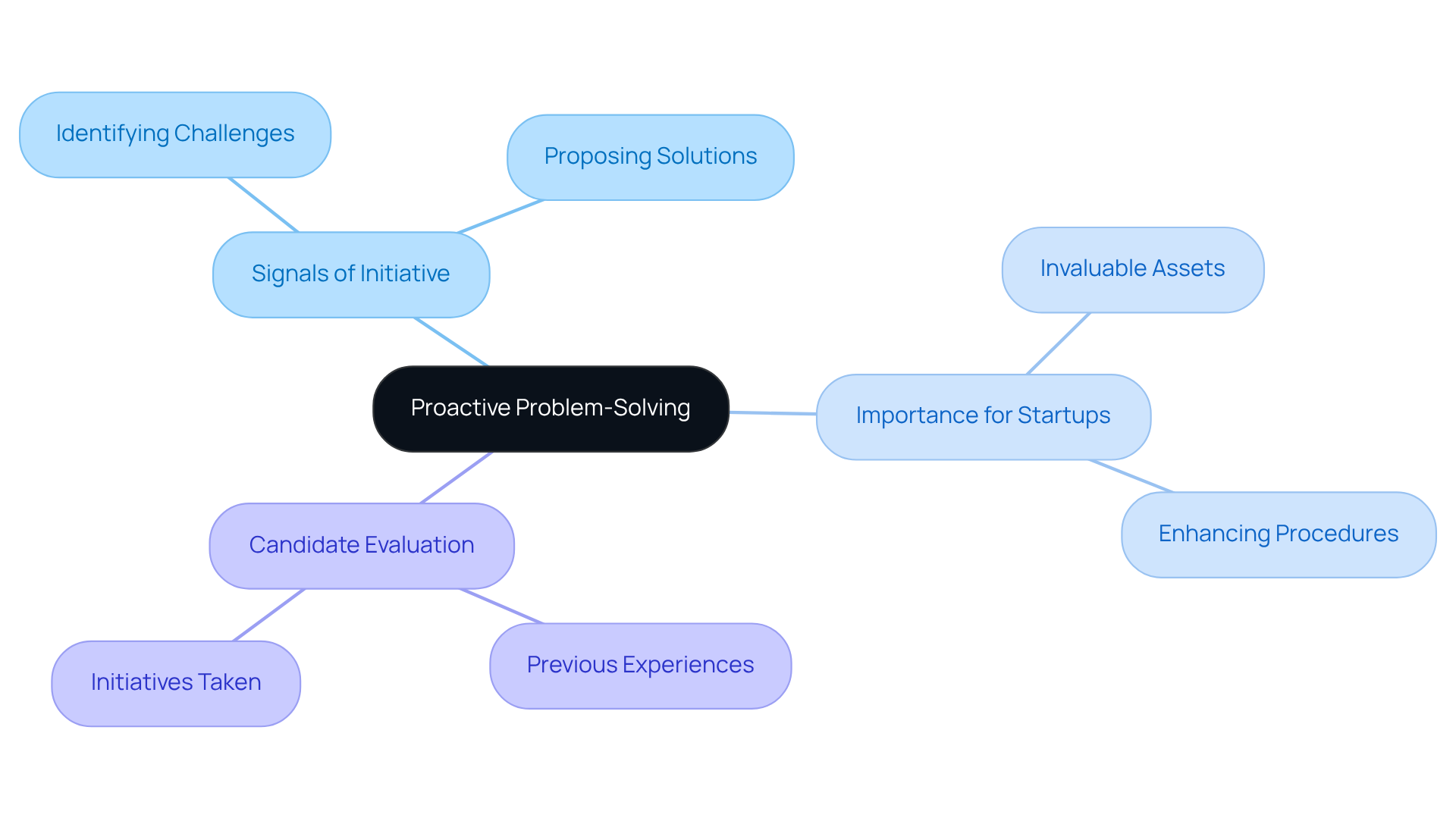
Growth Mindset: A Signal of Long-Term Potential in Engineering Hires
A growth mindset serves as a pivotal indicator of long-term potential, reflecting signals from engineering hires in startups. Candidates who possess a belief in their ability to learn and evolve are more inclined to embrace challenges and actively seek opportunities for development.
Startups must prioritize individuals who exhibit a commitment to continuous learning, as these traits can be identified through signals from engineering hires in startups, whether through:
- Professional development courses
- Certifications
- Self-directed projects
These candidates are not just learners; they are likely to . By fostering a culture that values growth, startups can ensure a dynamic workforce ready to tackle future challenges.
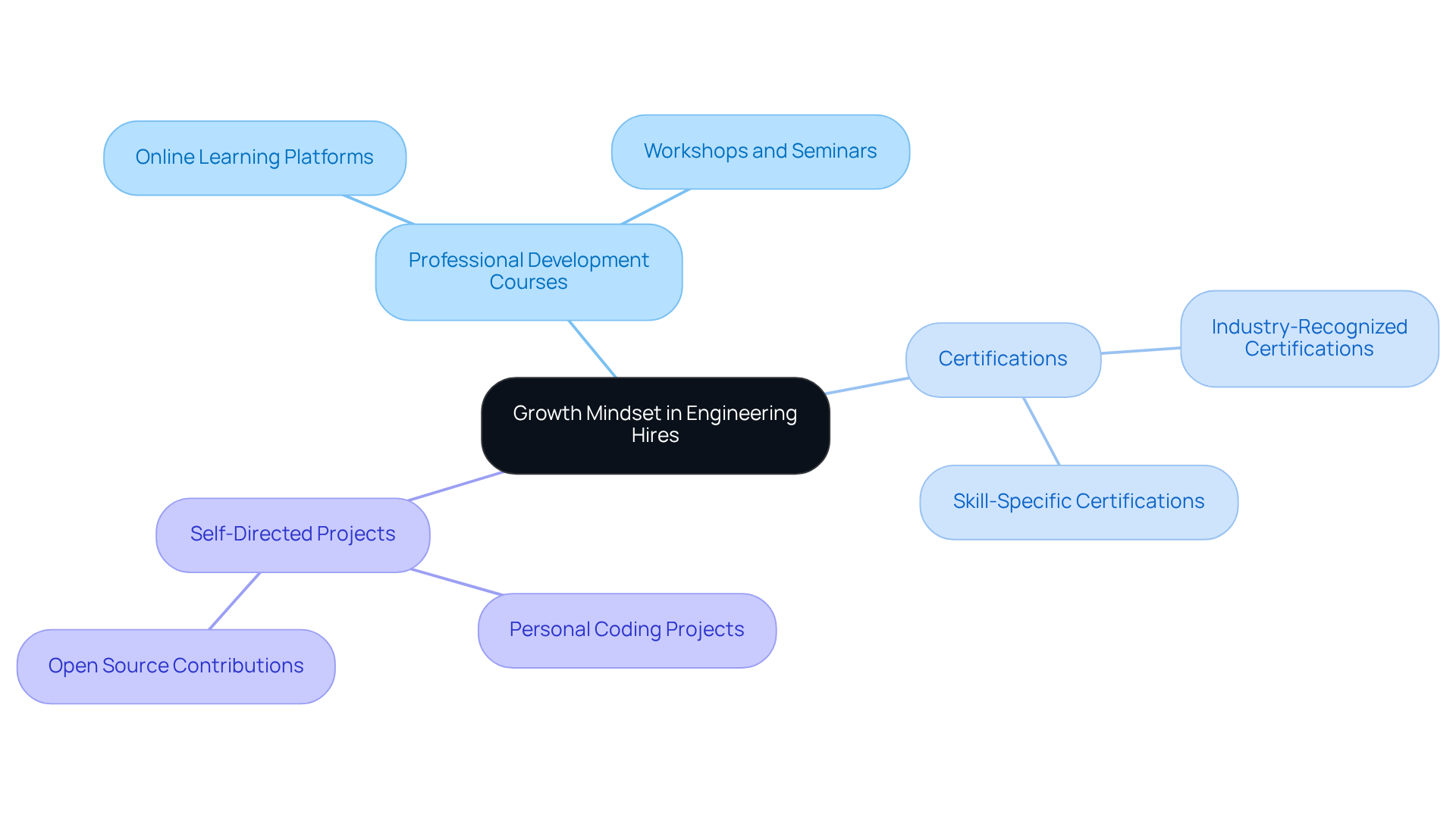
Conclusion
Identifying the right engineering talent is crucial for startups striving to excel in a competitive landscape. The signals indicating a candidate's potential—such as adaptability to remote work, cultural fit, technological flexibility, and effective communication—are essential for constructing a robust engineering team. By prioritizing these key attributes, startups can ensure they are not only hiring skilled professionals but also individuals who resonate with their vision and can contribute to long-term success.
Throughout this discussion, various signals from engineering hires have been highlighted. These encompass the significance of collaboration skills, practical experience, a user-centric mindset, proactive problem-solving abilities, and a growth mindset. Each of these elements plays a pivotal role in determining a candidate's fit within a startup environment, ultimately influencing the team's overall performance and innovation capacity.
In a rapidly evolving technological landscape, embracing these signals is imperative for startups aiming to attract and retain top engineering talent. Companies should actively integrate these insights into their recruitment strategies, ensuring they prioritize candidates who exhibit these essential qualities. By doing so, startups can cultivate a dynamic workforce prepared to tackle future challenges and propel their ventures forward.
Frequently Asked Questions
What is Websets and how does it help in identifying engineering talent?
Websets is a platform that uses advanced algorithms to analyze extensive datasets, enabling companies to efficiently identify top engineering talent. It enhances search outcomes through comprehensive candidate profiles that include LinkedIn details, emails, company information, and prior work experience.
What features does Websets offer to recruiters?
Websets allows recruiters to filter candidates by various criteria such as skills, experience, location, and more, facilitating informed decision-making and streamlining the talent acquisition process.
How does Websets benefit venture capitalists?
Websets provides valuable insights for venture capitalists by allowing them to filter portfolio companies based on industry, stage, and location, helping them discover startups that are at the forefront of technology.
Why is adaptability to remote work important for engineering hires in 2025?
Adaptability to remote work environments is crucial for engineering hires as candidates who are flexible and proficient in remote collaboration tools are in high demand. This adaptability enhances productivity and fosters group cohesion in hybrid work environments.
What should new ventures prioritize when hiring for remote work?
New ventures should prioritize candidates who have successfully navigated remote work challenges, as this quality is essential for success in an evolving workplace landscape.
Why is cultural fit important when hiring engineers for startups?
Cultural fit is vital because candidates who align with the company's mission and values are more likely to excel and contribute significantly to the team.
How can new ventures assess cultural fit during the hiring process?
New ventures can implement structured interviews and assessments to evaluate not only the necessary technical skills but also to confirm that new hires share the company's vision and ethos.
What is the ultimate benefit of prioritizing cultural fit in hiring?
Prioritizing cultural fit can lead to a more cohesive and effective team, enhancing overall performance and success within the organization.




